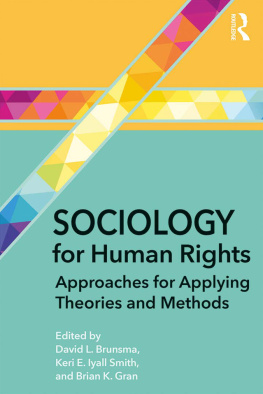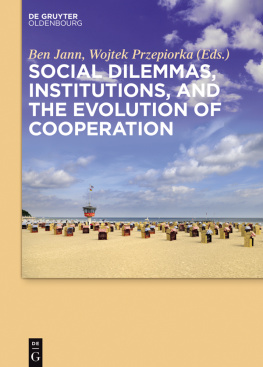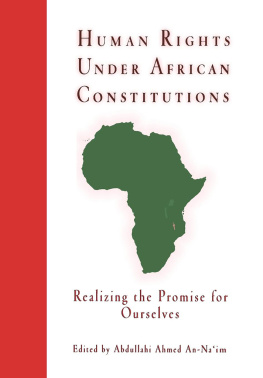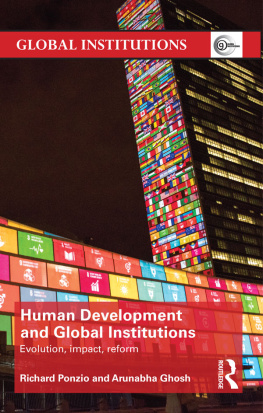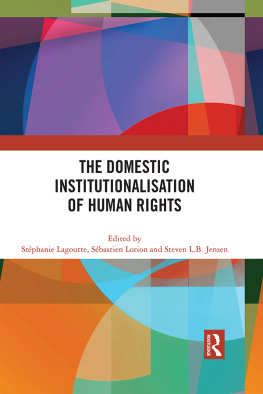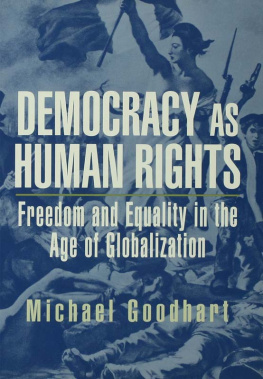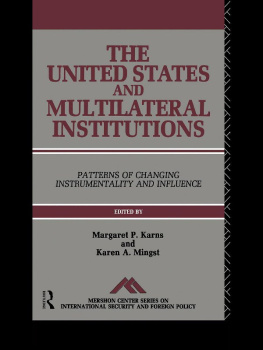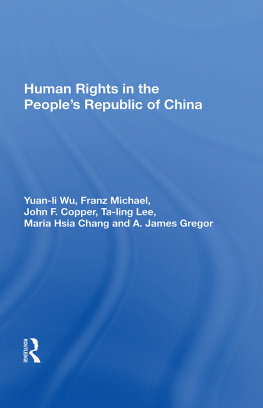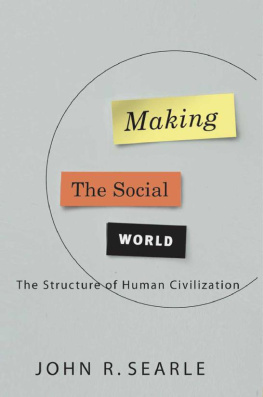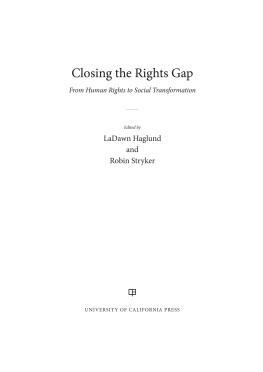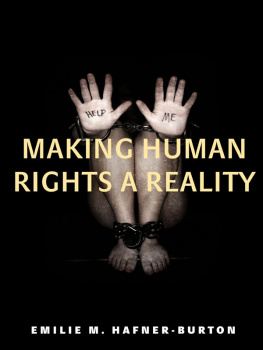INSTITUTIONS UNBOUND
Institutionslike education, family, medicine, culture, and laware powerful social structures shaping how we live together. As members of society we daily express our adherence to norms and values of institutions as we consciously and unconsciously reject and challenge them. Our everyday experiences with institutions not only shape our connections with one another, they can reinforce our binding to the status quo as we struggle to produce social change. Institutions can help us do human rights. Institutions that bridge nation-states can offer resources, including norms, to advance human rights. These institutions can serve as touchstones to changing minds and confronting human rights violations. Institutions can also prevent us from doing human rights. We create institutions, but institutions can be difficult to change. Institutions can weaken, if not outright prevent, human rights establishment and implementation. To release human rights from their institutional bindings, sociologists must solve riddles of how institutions work and determine social life. This book is a step forward in identifying means by which we can loosen human rights from institutional constraints.
David L. Brunsma is Professor of Sociology at Virginia Tech and co-editor of The Leading Rogue State.
Keri E. Iyall Smith is Associate Professor of Sociology at Suffolk University and author of States of Indigenous Movements.
Brian K. Gran is Associate Professor of Sociology and Law at Case Western Reserve University whose publications have appeared in The International Journal of Childrens Rights and in Child Welfare. Gran edits the journal Societies Without Borders.
First published 2016
by Routledge
711 Third Avenue, New York, NY 10017
and by Routledge
2 Park Square, Milton Park, Abingdon, Oxon, OX14 4RN
Routledge is an imprint of the Taylor & Francis Group, an informa business
2016 Taylor & Francis
The right of the editors to be identified as the authors of the editorial material, and of the authors for their individual chapters, has been asserted in accordance with sections 77 and 78 of the Copyright, Designs and Patents Act 1988.
All rights reserved. No part of this book may be reprinted or reproduced or utilised in any form or by any electronic, mechanical, or other means, now known or hereafter invented, including photocopying and recording, or in any information storage or retrieval system, without permission in writing from the publishers.
Trademark notice: Product or corporate names may be trademarks or registered trademarks, and are used only for identification and explanation without intent to infringe.
Library of Congress Cataloging in Publication Data
A catalog record for this book has been requested
ISBN: 978-1-138-65548-5 (hbk)
ISBN: 978-1-138-65551-5 (pbk)
ISBN: 978-1-315-62244-6 (ebk)
Typeset in Goudy Oldstyle Std
by Swales & Willis Ltd, Exeter, Devon, UK
INTRODUCTION
David L. Brunsma, Keri E. Iyall Smith, and Brian K. Gran
INSTITUTIONS: SOCIALLY CONSTRUCTED SOCIAL BINDINGS
Institutions are fundamental social constructions. While people build institutions, institutions definitely reflect their time and place. The design and functioning of institutions are organized around patterns of power and resources. Institutions often fulfill organizational purposes, but frequently organizations seem to obstruct rather than support their stated goals. They produce intended and unintended consequences. Institutions connect people. Sometimes these connections promote inequality, violence, and regressive policies and practices. Sometimes these connections foster strong and enduring social ties that are progressive, peaceful, and encourage justice and dignity.
The concept (and reality) of institutional life can be both quite abstract and at the same time is always very real. Yet, because of this dual reality, institutions are often difficult to think and talk about, let alone know how to identify, study, understand, and change. As such, we discuss the complexities of institutions before embarking on grappling with the chapters in this book. The eleven chapters in this book carve paths of sociological understanding of specific institutions and how they may look and operate differently if the ideas of human rights are taken seriously by society and/or sociologists. Yet, human rights are not yet fully taken seriously either.
If this were a traditional sociology textbook for, say, an Introduction to Sociology course, you might read that a social institution is a set of roles and behaviors centered on the performance of important social tasks. This arguably vague definition is meant to encourage you to think about, for instance, education as a social institution (which it is) where there are roles (e.g., teachers, students) and associated expected behaviors (e.g., to lecture, to teach, to listen, to learn) which, as a social structure, come together to educate. This is all true, but education as a social institution facilitates other social tasks as well, such as socialization (see Ballantine and Spade 2011). From the perspective of an individual in that human community (or perhaps from the voice and perspective, if you will, of that community itself) one might think about an institution by filling in the following blank: in this society/community, there is a way to do __________.
Thus, take citizenship as an institution as an example. In many societies, such as the United States, there is a way to do citizenship. While formally a person who wants to become a U.S. citizen is not obligated to forego her ethnic identity, she must fulfill residency requirements, pay fees, and sit for exams that are designed to ensure that this individual is informed of U.S. history, laws, and rights and duties. Indeed, a person who becomes a U.S. citizen may be more familiar with her rights and duties than many native-born citizens. In contrast, when a person becomes a French citizen, there are distinct ways to do citizenship. A prominent difference is that a person who wants to become a French citizen is expected to become French. The institution of citizenship differs because it is fully grounded in social and cultural worlds. Dalton Conley recently defined institutions in a more critical and dynamic way for introductory students: Social institutions are networks of structures in society that work to socialize the groups of people within them (Conley 2011). As such, institutions are not just out there, unchanging, they are purposefully structured the way they are structured and change over time within a structure of power relations too. We are the people within institutionssocialized by others and socializing others.
Take family as another exemplar institution. In a society like the United States there is a way to do family. When one mentions the word family one is invoking a cultural script as well as a social structurecertain bodies come to mind, certain expectations, certain relationships, certain beginnings and outcomes. This is, perhaps, why certain family structures experience a struggle for recognition and equalityfamilies founded by same-sex couples, with only one head of household, with extended relations, or families made of cohabitating couples (see in this volume). As the institution family changes, it does not reflect the socialization that we experienced. Institutions are fluid and constantly being made and remade by the people within them.


